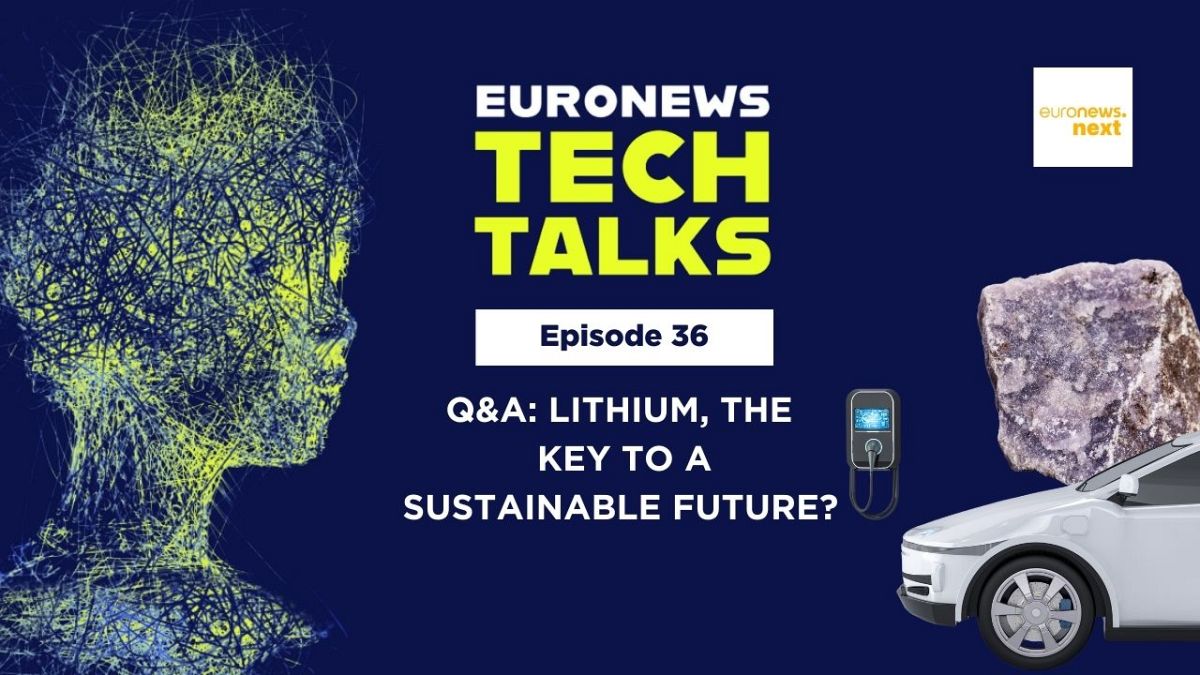What is lithium and is it the key to the ecological transition? Euronews Tech Talks explores the topic.
Lithium, often referred to as “white gold,” is among the most sought after raw materials in the world.
This metal plays a central role in our daily lives, as it is used in the rechargeable batteries that power our smartphones, PCs, electric vehicles, and e-readers.
These batteries, known as lithium-ion, are so groundbreaking that in 2019, their inventors – John B. Goodenough, M. Stanley Whittingham, and Akira Yoshino – were awarded the Nobel Prize in Chemistry for their development.
But what is so special about lithium and what environmental cost does it have?
These are some of the questions Euronews Tech Talks collected from our audience and put to Jean-Paul de Mussy, executive director of the European Lithium Institute, and Benjamin Sprecher, assistant professor at TU Delft specialising in critical raw materials.
What is lithium?
Lithium is a shiny silver metal with an incredibly soft consistency and low density.
This metal can be found around the world. Commonly, lithium is found in hard rock deposits like spodumene or in brine. If found in rocks, lithium is extracted through mining, while in salt lakes, lithium is pumped up from underground.
Overall, Australia, Chile, China, and Argentina are the world’s leading producers of lithium.
Europe also has some important reserves of this metal.
“According to the BRGM, the French Geological Survey Office, there are important exploitable deposits of lithium in Sweden, Finland, Ireland, the UK, France, Spain, Portugal, Germany and Serbia,” de Mussy said.
Despite its lithium potential, Europe is still highly dependent on imported lithium from Chile, Argentina, and the United States.
According to Sprecher, this dependency is mainly due to economic reasons.
“Europe is very expensive for mining,” he says. “There are advantages from a security point of view, but only if the supply chain is taken care of, which is not the case”.
Sprecher highlights that lithium extraction is only the first step of the process. If lithium is sent outside Europe to be processed, it might limit the security and economic advantages of extracting the metal in Europe.
Lithium: An ally or an enemy of the green transition?
Thanks to its low density, lithium can store lots of energy in a very small space.
This property makes lithium the key component in lithium-ion batteries, rechargeable light batteries that power today’s electronic and digital devices.
They can store 150 watt-hours of electricity per kilogramme and power smartphones, PCs, electric cars and energy storage systems, playing a central role in the energy transition.
“We need to move from a fossil fuel-based economy to an electricity-based economy where everything is run on electricity (…) and batteries are the way to do that currently,” Sprecher said.
But is lithium truly an ally of the green transition?
Both de Mussy and Sprecher say that lithium extraction comes with environmental and social costs.
Hard rock mining is energy-intensive, a drawback shared by extracting lithium from brine. In the latter case, lithium extraction also has dangerous effects on local communities’ access to water.
Brines are often in arid areas in the so-called lithium triangle, which spams Chile, Argentina, and Bolivia. These areas already face limited water availability, a challenge further exacerbated by lithium production, which requires substantial amounts of water.
In addition to the environmental and social costs of lithium extraction, de Mussy said that lithium-ion batteries are difficult to recycle and can sometimes explode if not taken care of.
But if lithium-ion batteries still have some drawbacks, are there any alternatives?
Find out the answer in this episode of our podcast Euronews Tech Talks.
Checkout latest world news below links :
World News || Latest News || U.S. News
The post What is lithium and how does it power our modern world? | Podcast appeared first on WorldNewsEra.

